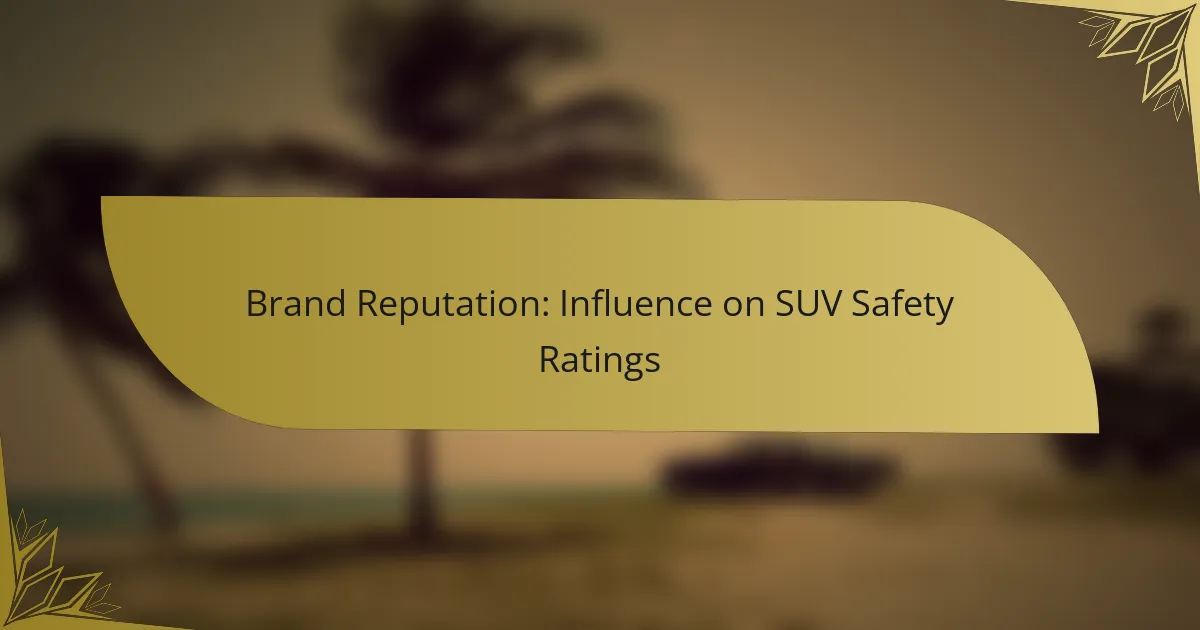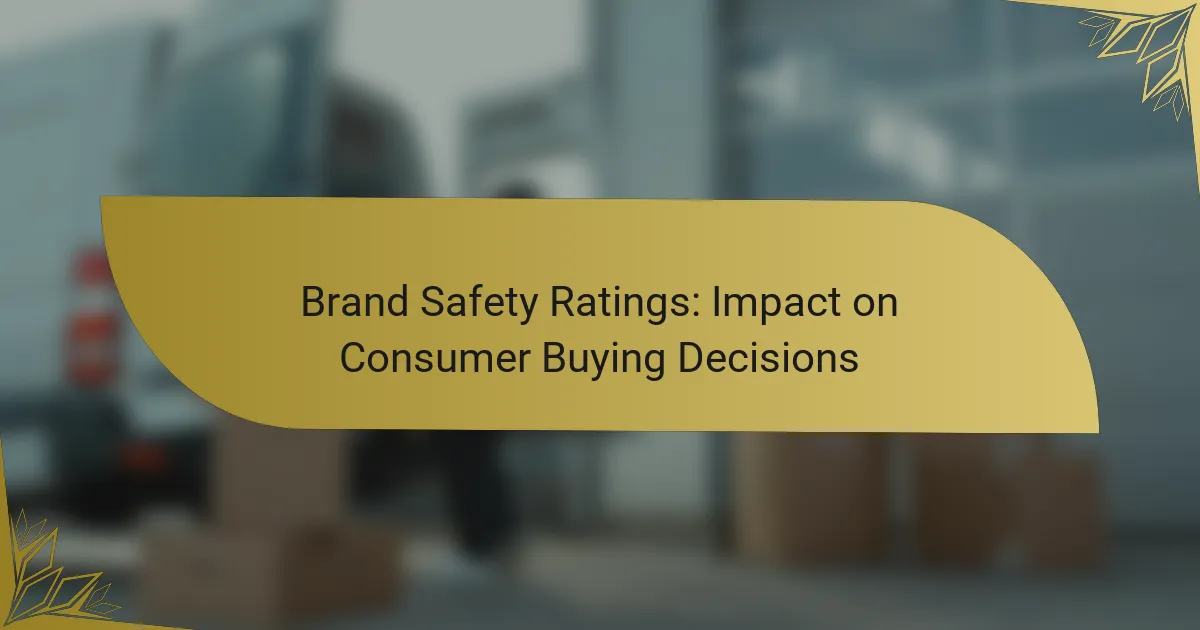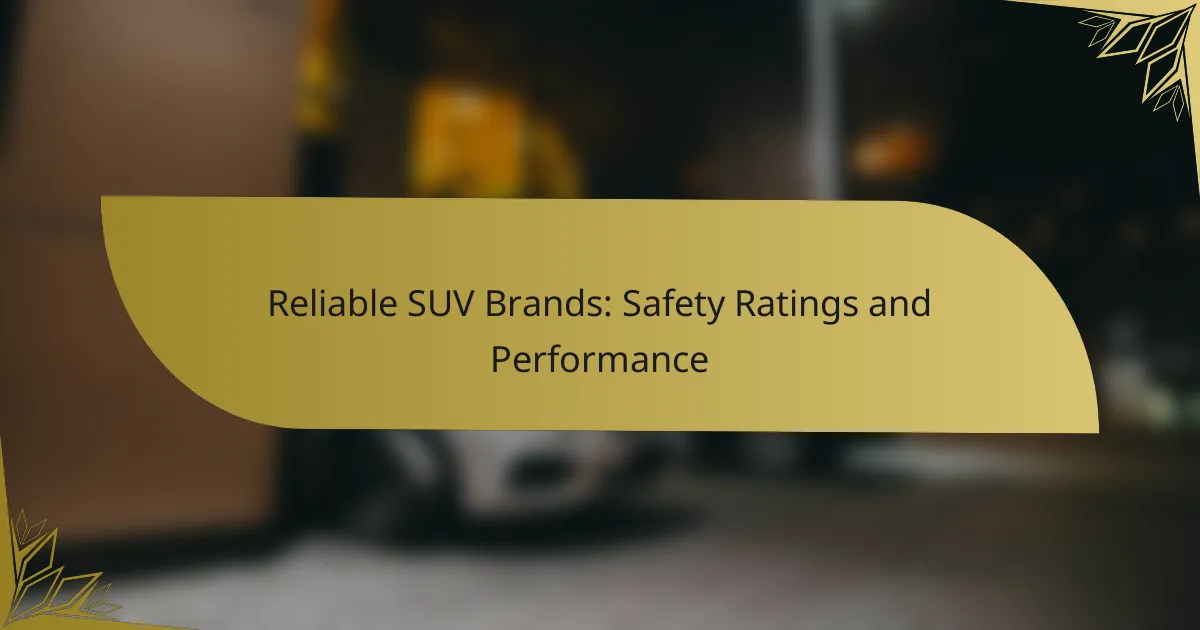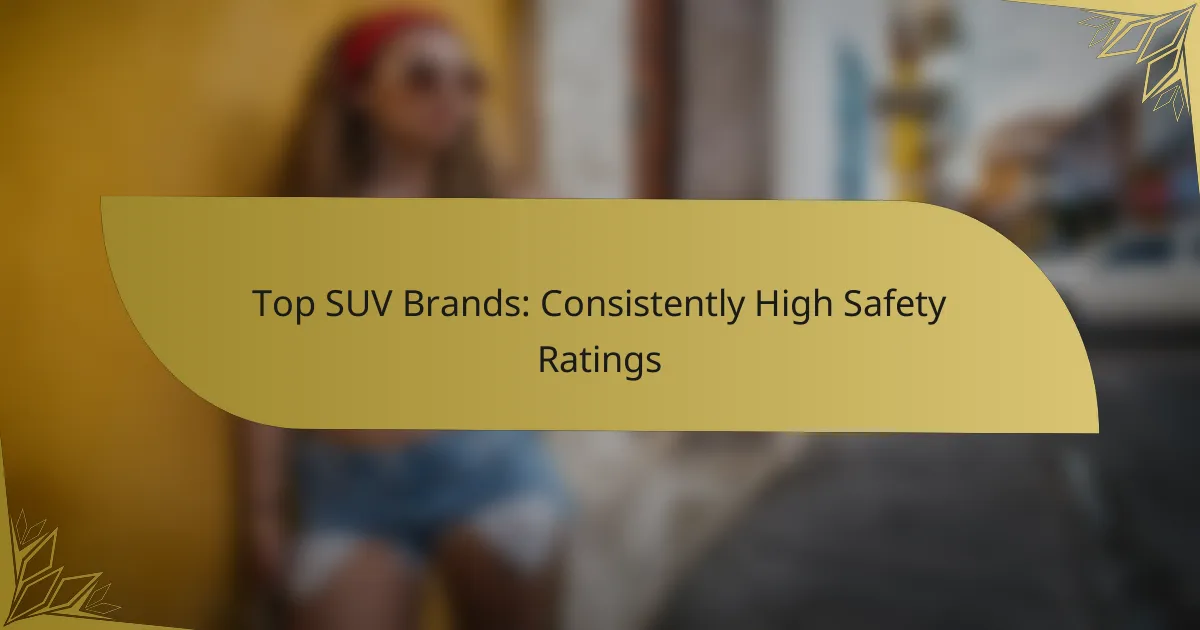Brand reputation plays a crucial role in determining SUV safety ratings, as it shapes consumer perceptions and influences regulatory evaluations. Brands like Toyota and Ford, recognized for their reliability and safety innovations, can enhance their safety ratings through positive public perception, while those with a tarnished reputation may face lower assessments. Ultimately, consumer opinions and reviews significantly impact both safety ratings and a brand’s overall market performance.
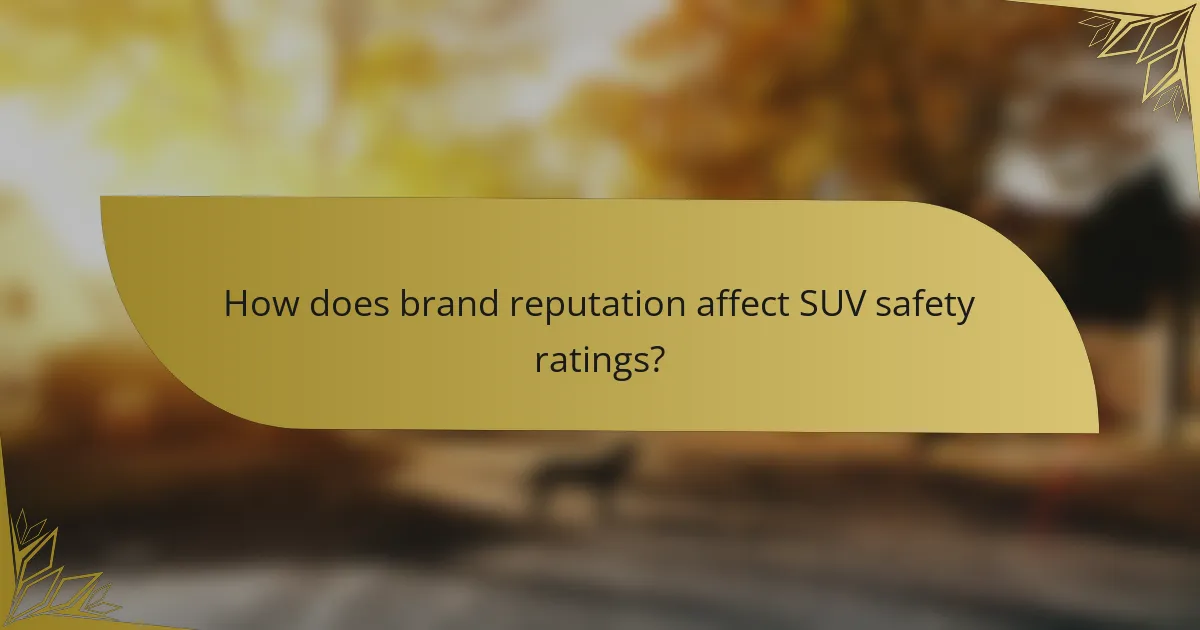
How does brand reputation affect SUV safety ratings?
Brand reputation significantly influences SUV safety ratings by shaping consumer perceptions and impacting regulatory scrutiny. A strong reputation can lead to higher safety ratings, while a poor reputation may result in lower assessments from both consumers and safety organizations.
Positive brand reputation enhances safety perceptions
A positive brand reputation can enhance consumer trust in an SUV’s safety features. When a manufacturer is known for producing reliable vehicles, buyers are more likely to assume that their latest models, including SUVs, meet high safety standards.
For example, brands with a history of strong safety performance often receive favorable ratings from organizations like the National Highway Traffic Safety Administration (NHTSA) and the Insurance Institute for Highway Safety (IIHS). This can lead to increased sales and customer loyalty, further reinforcing the brand’s reputation.
Negative brand reputation can lower safety ratings
Conversely, a negative brand reputation can adversely affect safety ratings. If a manufacturer has faced recalls or safety scandals, consumers may be skeptical of their new SUV models, leading to lower perceived safety.
For instance, if an SUV brand is associated with multiple safety issues, it may receive lower ratings from safety organizations, even if the latest models have improved features. This can create a cycle where poor reputation leads to decreased sales, which in turn affects the brand’s ability to invest in safety innovations.
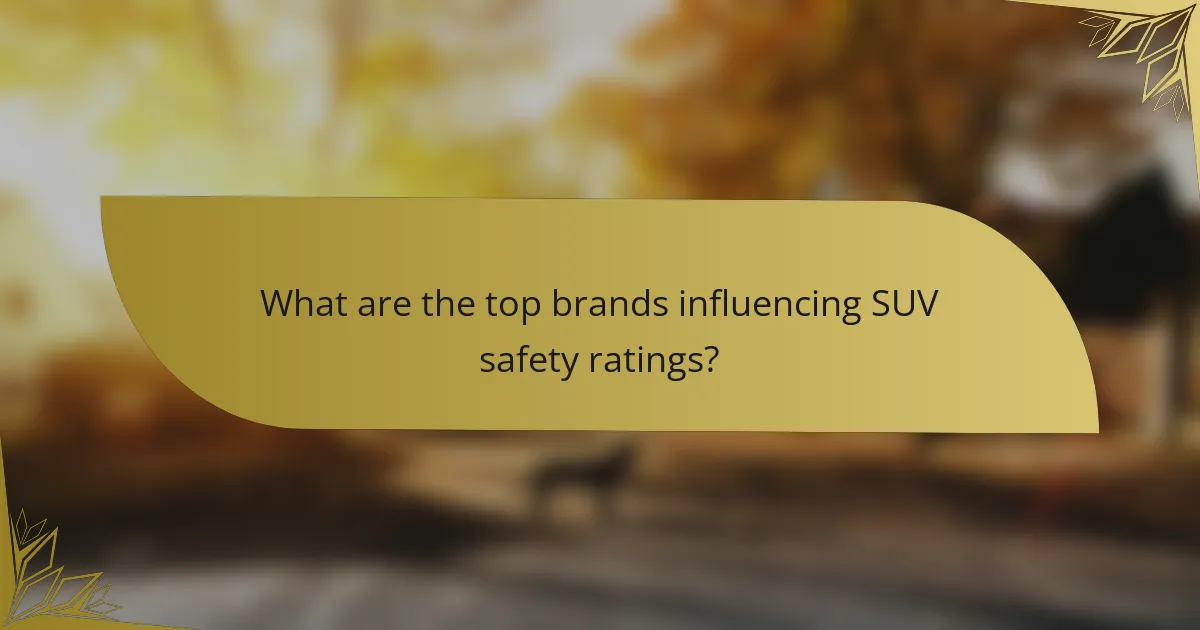
What are the top brands influencing SUV safety ratings?
The top brands influencing SUV safety ratings include Toyota and Ford, known for their strong reputations in reliability and safety innovations, respectively. These brands significantly shape consumer perceptions and regulatory assessments of vehicle safety through their consistent performance and advancements in technology.
Toyota’s reputation for reliability
Toyota has built a solid reputation for reliability, which directly impacts its SUV safety ratings. Consumers often associate Toyota vehicles with durability and low maintenance costs, leading to higher trust in their safety features.
This brand’s commitment to quality is reflected in its rigorous testing and adherence to safety standards. For instance, many Toyota SUVs consistently receive high marks in crash tests conducted by organizations like the National Highway Traffic Safety Administration (NHTSA) and the Insurance Institute for Highway Safety (IIHS).
Ford’s impact on safety innovations
Ford has made significant strides in safety innovations that enhance SUV safety ratings. The company invests heavily in research and development to integrate advanced safety technologies, such as collision avoidance systems and adaptive cruise control, into its SUVs.
These innovations not only improve safety ratings but also influence consumer choices. For example, Ford’s Explorer and Escape models often feature cutting-edge safety tech, which can lead to better ratings in safety assessments and increased consumer confidence in the brand.
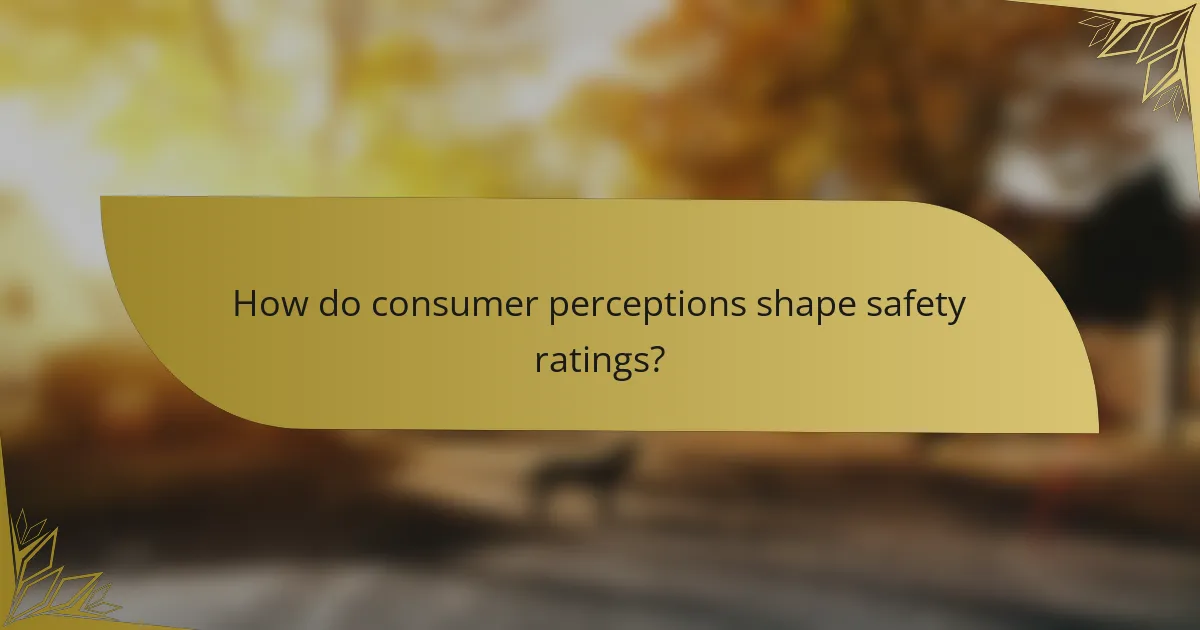
How do consumer perceptions shape safety ratings?
Consumer perceptions significantly influence safety ratings by affecting how vehicles are evaluated and perceived in the marketplace. Positive or negative reviews can sway both public opinion and the assessments made by safety organizations, ultimately impacting a brand’s reputation and sales.
Consumer reviews influence safety assessments
Consumer reviews play a crucial role in shaping safety assessments for SUVs. When a large number of users report positive experiences regarding safety features, this can enhance the vehicle’s reputation and lead to higher safety ratings. Conversely, negative reviews highlighting safety concerns can lower a vehicle’s perceived safety, regardless of its actual performance in standardized tests.
For instance, if multiple reviews mention issues with a specific SUV’s braking system, safety organizations may take these reports into account, potentially affecting the vehicle’s overall safety rating. This highlights the importance of monitoring consumer feedback and addressing concerns promptly.
Brand loyalty affects safety rating perceptions
Brand loyalty can significantly skew perceptions of safety ratings. Consumers who are loyal to a particular brand may overlook safety concerns or interpret ratings more favorably than they are warranted. This can create a disconnect between actual safety performance and consumer perception.
For example, a well-known brand with a loyal customer base may receive higher ratings from its users, even if independent assessments reveal safety shortcomings. It’s essential for consumers to remain objective and consider third-party safety evaluations alongside brand reputation when making purchasing decisions.
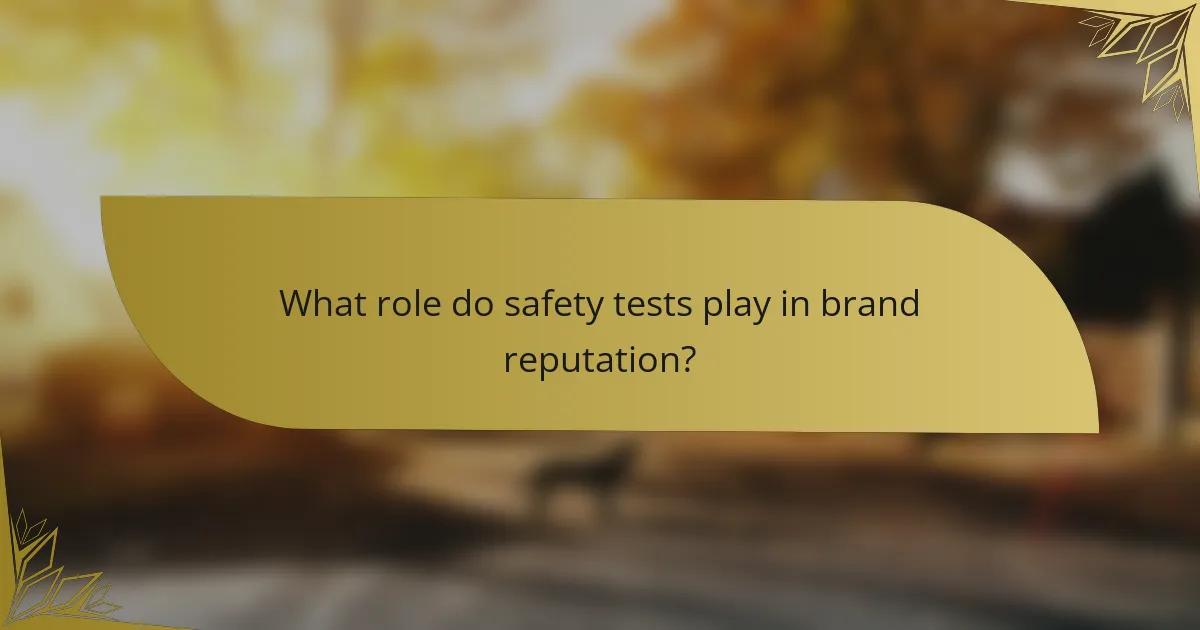
What role do safety tests play in brand reputation?
Safety tests are crucial for shaping a brand’s reputation, as they provide measurable data on vehicle performance in crash scenarios. High safety ratings can enhance consumer trust and influence purchasing decisions, while poor results can damage a brand’s image significantly.
Crash test results impact brand image
Crash test results are often publicized and can greatly affect a brand’s image. For example, vehicles that consistently receive high ratings from organizations like the National Highway Traffic Safety Administration (NHTSA) or the Insurance Institute for Highway Safety (IIHS) are viewed more favorably by consumers. Conversely, brands that fail to perform well in these tests may struggle to attract buyers.
Consumers frequently rely on crash test ratings when comparing SUVs. A vehicle that earns a five-star rating is likely to be perceived as safer than one with a three-star rating, influencing potential buyers’ decisions. This perception can lead to increased sales and a stronger market position for brands with better safety records.
Safety awards enhance brand credibility
Receiving safety awards can significantly boost a brand’s credibility in the automotive market. Awards from reputable organizations not only validate a vehicle’s safety features but also serve as a marketing tool that brands can leverage to attract customers. For instance, winning a “Top Safety Pick” designation can enhance consumer confidence and encourage purchases.
Brands should actively promote their safety awards in advertising and on their websites. Highlighting these accolades can differentiate them from competitors and reinforce their commitment to safety. However, it’s essential to maintain transparency and ensure that the claims made about safety awards are accurate to avoid potential backlash from consumers.
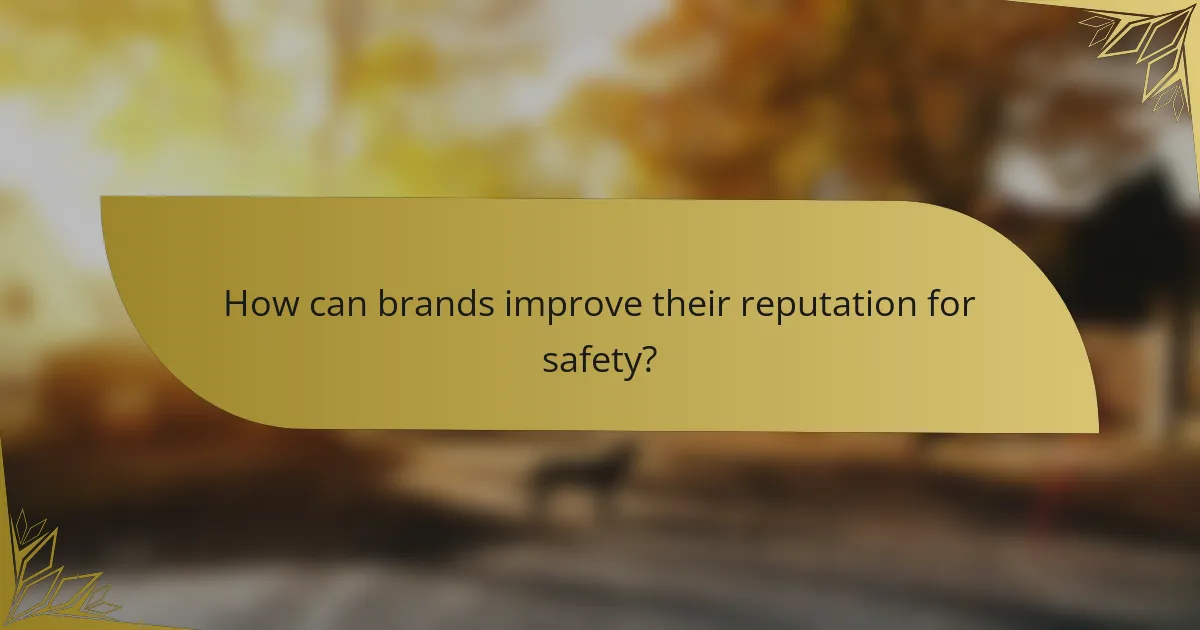
How can brands improve their reputation for safety?
Brands can enhance their reputation for safety by prioritizing the development and implementation of advanced safety features while maintaining open communication about safety ratings. This proactive approach not only builds consumer trust but also aligns with regulatory standards and market expectations.
Investing in advanced safety features
To improve safety ratings, brands should invest in cutting-edge safety technologies such as automatic emergency braking, lane-keeping assist, and advanced airbag systems. These features can significantly reduce the likelihood of accidents and enhance overall vehicle safety.
Brands can also consider incorporating driver assistance systems that utilize sensors and cameras to monitor the vehicle’s surroundings. This investment not only meets consumer demand for safer vehicles but can also lead to better ratings from safety organizations like the National Highway Traffic Safety Administration (NHTSA) or the Insurance Institute for Highway Safety (IIHS).
Transparent communication of safety ratings
Clear and honest communication regarding safety ratings is crucial for building a trustworthy brand reputation. Brands should regularly publish safety test results and provide easy access to information about how their vehicles perform in crash tests and other safety evaluations.
Engaging with customers through various channels, such as social media and official websites, can help demystify safety ratings. Brands should highlight improvements and innovations in safety features, ensuring that consumers are informed about the steps taken to enhance vehicle safety.
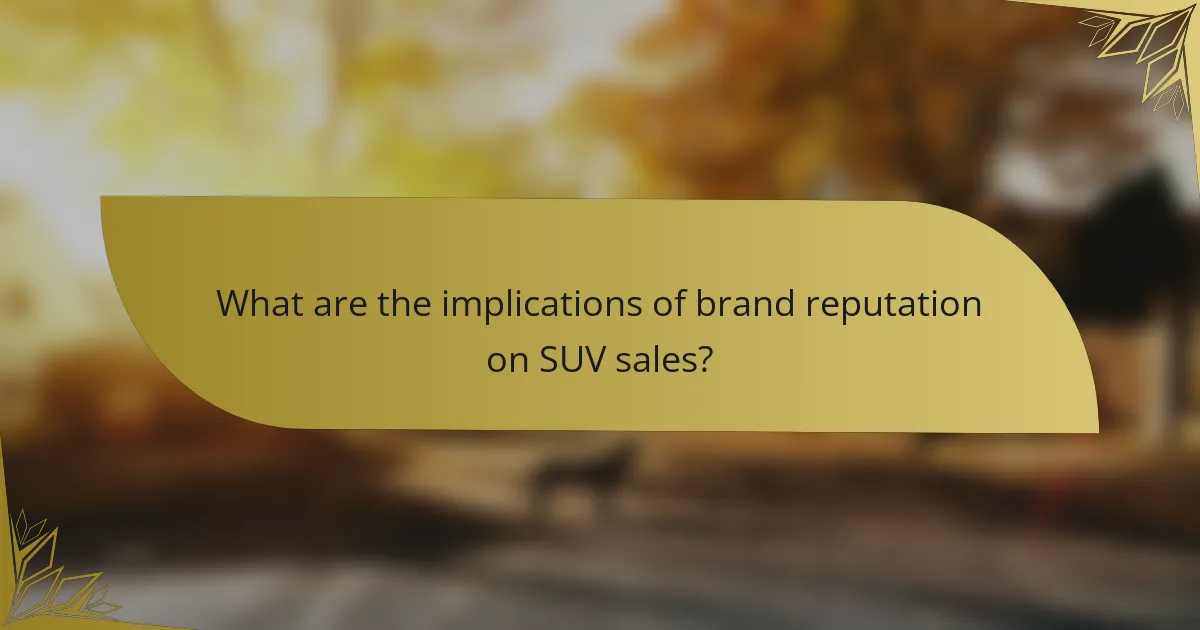
What are the implications of brand reputation on SUV sales?
Brand reputation significantly impacts SUV sales by shaping consumer perceptions and influencing purchasing decisions. A strong reputation often correlates with higher sales, as consumers tend to favor brands they trust for safety and reliability.
Higher safety ratings lead to increased sales
Safety ratings play a crucial role in the sales of SUVs, as consumers prioritize vehicles that offer protection for themselves and their families. Brands with higher safety ratings from recognized organizations, such as the National Highway Traffic Safety Administration (NHTSA) or the Insurance Institute for Highway Safety (IIHS), often see a boost in sales, sometimes by as much as 20-30% compared to lower-rated competitors.
For instance, an SUV that earns a five-star safety rating is more likely to attract buyers than one with a three-star rating. This trend underscores the importance of manufacturers investing in safety features and technologies to enhance their ratings and, consequently, their market appeal.
Brand reputation affects consumer trust
Consumer trust is deeply intertwined with brand reputation, particularly in the automotive industry. Brands that have a history of reliability and safety are more likely to earn the confidence of potential buyers, leading to repeat purchases and brand loyalty.
For example, a brand known for producing durable and safe SUVs will likely retain customers who prioritize these attributes. Conversely, brands that have faced recalls or safety scandals may struggle to regain consumer trust, resulting in diminished sales and a tarnished reputation.

What emerging trends are shaping SUV safety and brand reputation?
Emerging trends in SUV safety and brand reputation include advancements in technology, particularly the integration of artificial intelligence, and a growing consumer demand for transparency in safety ratings. These factors are influencing how manufacturers approach safety features and how consumers perceive brands.
Integration of AI in safety assessments
The integration of artificial intelligence in safety assessments is revolutionizing how SUVs are evaluated for safety. AI algorithms analyze vast amounts of data from crash tests, real-world incidents, and consumer feedback to provide more accurate safety ratings.
For instance, AI can simulate various crash scenarios, allowing manufacturers to identify potential weaknesses in design before physical testing. This proactive approach not only enhances safety but also improves brand reputation as consumers increasingly favor brands that prioritize advanced safety features.
However, relying solely on AI can pose risks. Manufacturers should ensure that human oversight remains integral to the assessment process to avoid potential biases in data interpretation. Balancing AI insights with traditional testing methods is crucial for maintaining credibility in safety ratings.
